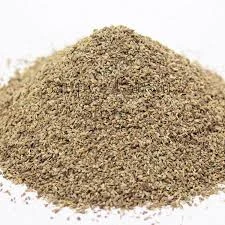Contents
What are carom seeds ?
Carom seeds commonly known as ajwain, are packed with fiber, antioxidants, and various essential nutrients. These small but powerful seeds are renowned for their potential health benefits, such as enhancing cholesterol levels and aiding in digestion.
Originating from the ajwain herb (Trachyspermum ammi), carom seeds are a staple in Indian cuisine. While they are often referred to as “seeds,” technically, they are the fruits of the ajwain plant. Their color ranges from slightly green to brown, and they possess a strong, bitter flavor that can be quite distinctive. Although they may resemble cumin seeds, their taste and aroma have more in common with thyme.
Carom seeds are usually available in their whole form, but they can also be ground into a fine powder to be used as a versatile cooking spice. Nutritionally, carom seeds stand out due to their richness in fiber, antioxidants, and an array of vitamins and minerals. This impressive nutritional profile has led to their use in traditional Indian medicine for centuries.
In the following sections, we will explore the top six health benefits and uses of carom seeds that make them a valuable addition to your diet.
1. Fight bacteria and fungi

Carom seeds(Ajwain) are renowned for their potent antibacterial and antifungal properties. This effectiveness is largely due to two key active compounds: thymol and carvacrol. Research has demonstrated that these compounds can effectively inhibit the growth of various bacteria and fungithymol and carvacrol have shown promise in combating harmful bacteria such as Escherichia coli (E. coli) and Salmonella, both of which are known to cause food poisoning and other serious health issues . Notably, one particula exhibited greater effectiveness against multidrug-resistant strains of bacteria and fungi, including Candida albicans, Candida krusei, and Streptococcus mutans, when compared to other solvents .
Despite these promising results, further research al to understand the full extent of how carom seeds(Ajwain) may influence bacterial and fungal growth in humans. As interest in natural remedies continues to grow, carom seeds stand out as a potential ally in the fight against resistant strains of pathogens.
2. Improve cholesterol levels
Animal studies suggest that carom seeds(Ajwain) may play a significant role in lowering cholesterol and triglyceride levels, both of which are crucial factors in the risk of developing heart disease. In a study involving rabbits, researchers found that carom seed(Ajwain) powder effectively reduced total cholesterol, LDL (bad) cholesterol, and triglyceride levels, indicating a potential heart-health benefit.
Similarly, a separate study conducted on rats showed that carom seed extract not only lowered total cholesterol and triglycerides but also effectively reduced LDL levels while increasing the levels of HDL (good) cholesterol, known for its protective qualities against heart disease.
However, it’s important to note that both studies indicated that carom seed powder was most effective at treating high cholesterol levels only when administered in high doses, which far exceed the amounts typically consumed in a normal diet.
As promising as these findings are, more extensive studies are necessary to determine how carom seeds might impact cholesterol levels in humans. This ongoing research could unlock new potential for incorporating carom seeds(Ajwain) into heart-healthy dietary strategies.
3. May lower blood pressure
High blood pressure, also known as hypertension, is a prevalent health condition that significantly increases the risk of serious issues like heart disease and stroke. Traditional approaches to managing hypertension often involve medications, such as calcium-channel blockers, which work by preventing calcium from entering the heart cells. This process relaxes and expands blood vessels, ultimately leading to lower blood pressure levels.
Interestingly, emerging research suggests that thymol, a key component found in carom seeds(Ajwain), may exhibit similar calcium-channel-blocking effects, potentially aiding in the reduction of blood pressure. For example, studies have shown that carom seed extract can effectively lower blood pressure levels in rats, highlighting its promising effects.
However, it’s important to note that research on the effectiveness of carom seeds(Ajwain) in lowering blood pressure in humans remains limited. To fully understand the potential benefits and mechanisms by which these seeds may impact blood pressure, further studies are necessary. This ongoing research could pave the way for new, natural approaches to managing hypertension and improving cardiovascular health.
4. Combats peptic ulcers and relieves indigestion
Carom seeds(Ajwain) are widely recognized in Ayurvedic medicine as a natural remedy for various digestive issues. Research indicates that carom seed extract may play a role in combating peptic ulcers, which are painful sores that can develop in the esophagus, stomach, or small intestine. For instance, a study conducted over two weeks with rats demonstrated that treatment with carom seed extract significantly improved stomach ulcers induced by ibuprofen, showcasing effects comparable to those of standard medications used to treat such ulcers.
In addition to their potential benefits for peptic ulcers, carom seeds may also assist in preventing and alleviating gas and chronic indigestion. Indigestion is often characterized by persistent discomfort in the upper stomach, with delayed gastric emptying being one of the contributing factors. Interestingly, preliminary research has suggested that carom seed spice can accelerate the movement of food through the stomach in rats, which might aid in improving symptoms of indigestion. However, it is important to note that these findings have yet to be confirmed in human studies. Further research is needed to fully understand the extent of carom seeds’ benefits for digestive health in people.
5. May prevent coughing and improve airflow
Emerging evidence suggests that carom seeds(Ajwain) may offer relief from coughing. Although research in this area is limited, one intriguing study conducted on guinea pigs indicated that carom seeds exhibited a greater anticoughing effect than codeine, a widely used medication for treating coughs. This finding highlights the potential of carom seeds as a natural alternative for managing cough symptoms.
Additionally, carom seeds(Ajwain) may enhance airflow to the lungs. In a study involving individuals with asthma, administration of carom seed extract at a dosage of 0.057–0.113 ml per pound (0.125–0.25 ml per kg) resulted in increased airflow to the lungs within 30 to 180 minutes post-treatment. Notably, this effect was found to be comparable to that of theophylline, a common medication prescribed for asthma management.
Despite these promising results, further research is necessary to fully understand the impact of carom seeds on coughing and other respiratory symptoms in humans. Continued studies will help elucidate their potential benefits and establish more comprehensive guidelines for their use in respiratory health.
Bottom of Form
6. Has anti-inflammatory effects
Inflammation plays a dual role in the body; it can be both beneficial and detrimental. Short-term inflammation serves as your body’s natural defense mechanism against illness or injury, helping to promote healing. Conversely, chronic inflammation can lead to adverse health effects and increase the risk of various diseases.
Research has highlighted that carom seeds(Ajwain) possess notable anti-inflammatory properties and may effectively reduce inflammation within the body. For instance, a study involving rats demonstrated that supplementation with carom seed extract resulted in significant reductions in inflammatory responses.
In another recent study, arthritis-induced rats that received carom seed extract over a 21-day period showed marked improvements in inflammatory markers, including decreased levels of elastase—an enzyme linked to inflammation. These findings suggest that carom seed extract could potentially serve as a therapeutic option for managing inflammatory diseases.
While further research is essential to fully understand the implications of carom seeds in treating inflammation, current evidence points to their promising role as a natural remedy for reducing inflammation and supporting overall health.
Bottom of Form
Are carom seeds safe?
For most people, carom seeds are safe to consume.
Still, pregnant or breastfeeding women should avoid them due to potentially dangerous effects on fetal health, including potential birth defects or even miscarriage (1Trusted Source).
If you’re pregnant, it’s important to consult with your healthcare provider before taking carom seeds in seed, extract, or powdered form.
Additionally, anecdotal reports of nausea after ingesting high doses of carom seeds have been noted. For this reason, the seeds should be eaten in small amounts.
The bottom line
Carom seeds, widely recognized for their culinary and medicinal uses, have been a staple in traditional Indian cuisine and Ayurvedic medicine for centuries. Research has revealed that these seeds possess remarkable antibacterial and anti-inflammatory properties, suggesting their potential effectiveness in treating peptic ulcers, as well as in lowering blood pressure and cholesterol levels.
However, it’s important to note that much of the existing evidence is derived from animal studies and test-tube experiments. Therefore, further comprehensive research is essential to fully elucidate the benefits of carom seeds on human health.
In general, carom seeds are considered safe for most individuals. Nevertheless, caution is warranted for pregnant women, as consumption has been linked to adverse effects on fetal development. Thus, while carom seeds offer numerous health advantages, it is crucial to approach their use with care, particularly during pregnancy.








